Job Quality Tools Library > Section 4: Strengthening Practices to Improve Job Quality > Tools: Equity and Inclusion
Originally posted: May 11, 2020
Last updated: September 21, 2023
Section 4, the core of the library, includes tools designed to address specific components of job quality. Once organizations have determined their job quality priorities, they can turn to these tools to shift practices in the areas they have deemed most urgent, either in their own organizations or in the businesses with which they partner.
We’ve organized tools into categories that reflect the job quality attributes most commonly cited across the job quality frameworks and definitions included in Section 1. These attributes include wages, benefits, scheduling, legal rights, equity and inclusion, opportunity to build skills and advance, supportive work environment, worker voice, and employee ownership. Each attribute also includes sub-categories for ease of navigation.
↓ Tools and Resources Below the Box ↓
Library Navigation
- Job Quality Tools Library Homepage
- About This Library
- Section 1: Understanding Job Quality
- Section 2: Assessing Job Quality
- Section 3: Engaging Businesses on Job Quality
- Section 4: Strengthening Practices to Improve Job Quality
- Section 5: Monitoring Improvements in Job Quality
- Special: COVID-19 Response Tools and Resources
- Index of Tools by Field
Tools
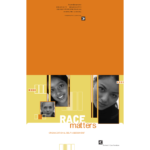
The Annie E. Casey Foundation – Race Matters: Organizational Self-Assessment
Who’s It For: Employers, Economic Development, Investing and Lending, Worker Advocacy, Workforce Development
What’s It For: This organizational self-assessment can be used to measure staff competencies and awareness of racial inequities in your organization. The assessment includes questions related to competencies as well as organizational operations. The resulting racial equity score corresponds to potential next steps and tools that can help support your organization wherever you may be on your racial equity journey.

The Annie E. Casey Foundation – Race Matters: Racial Equity Impact Analysis
Who’s It For: Employers, Policy, Worker Advocacy, Workforce Development
What’s It For: This impact analysis tool by Race Matters can be used to assess the impact of policies, programs, and practices on racial equity. The tool provides a set of five guiding questions to determine if existing and proposed policies and programs are likely to address specific racial disparities in the United States.
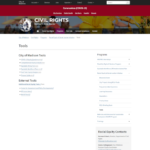
City of Madison – Racial Equity & Social Justice Initiative Tools
Who’s It For: Employers, Economic Development, Investing and Lending, Policy, Worker Advocacy, Workforce Development
What’s It For: This set of equity tools is designed to help organizations and individuals operationalize equity. Included is an equitable hiring tool, equitable workforce plans, and equity analysis tools. Tools focused on policy and budgeting provide a framework for users to consider whose voices are at the table when designing policies and regulations, who is likely to be impacted, and if the policy outcomes would lead to a more or less equitable environment. While designed for local government, these tools have broad relevance for a wide audience, including employers, policymakers, workforce development professionals, and others interested in centering equity in their policy and programmatic work.
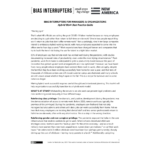
New America – Bias Interrupters for Managers and Organizations
Who’s It For: Employers, Worker Advocacy, Workforce Development
What’s It For: This toolkit from New America is designed to help managers develop return-to-work plans that center equity and inclusion in their management practices. Without intentional planning, transitioning back to in-person work could reinforce ableism as well as class, gender, non-caregiver, and race privileges. As society moves to rebuild and recover, careful consideration to avoid mishandling the return to on-site work is imperative. This toolkit has actionable resources to help managers gather input from employees, understand legal requirements surrounding the return to in-person work, and select equitable best practices. Employers may find this tool useful for developing successful, equitable hybrid work models. Additionally, workforce development and worker advocacy professionals may find this toolkit helpful to share with their employer-partners.
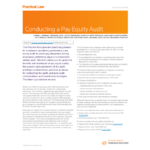
Practical Law – Conducting a Pay Equity Audit
Who’s It For: Employers, Policy, Worker Advocacy, Workforce Development
What’s It For: In this paper, authors Karen L. Corman and Ryne C. Posey outline several key considerations for implementing a pay audit to assess pay disparities among current and incoming staff. Topics explored include the potential benefits and drawbacks of pay equity audits, the purpose and parameters of the audit, privilege considerations, practical guidance for conducting the audit, and post-audit considerations and remediation strategies. HR professionals and other individuals involved in conducting pay audits may find this resource useful. Additionally, those who work with employers may be interested in sharing this with their partners. You may access this downloadable document by clicking on the “PDF” symbol towards the top, right-hand side of the linked webpage.
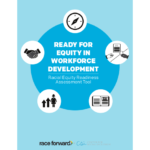
Who’s It For: Worker Advocacy, Workforce Development
What’s It For: This racial equity tool is designed to support workforce development organizations and practitioners to advance their racial equity practice. The assessment guides workforce development organizations and practitioners to evaluate their programs, operations, and culture in order to identify areas of strength and opportunities for growth. Practitioners can use the toolkit to explore approaches that support institutional racial equity, evaluate their current efforts, and plan next steps to strengthen their practices.
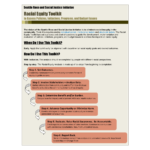
Seattle Race and Social Justice Initiative – Racial Equity Toolkit
Who’s It For: Employers, Economic Development, Investing and Lending, Policy, Worker Advocacy, Workforce Development
What’s It For: The Racial Equity Toolkit provides a process and set of questions designed to analyze how policies, initiatives, programs, and budget issues benefit or burden communities of color. The toolkit can be used to guide the development, implementation, and evaluation of strategies and solicit input from community members and staff. Although the toolkit includes some information specific to the City of Seattle, it can be adapted by a range of stakeholders within and beyond local governments interested in centering racial equity in job quality strategies.
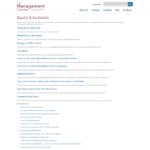
The Management Center – Equity & Inclusion Tools
Who’s It For: Employers, Economic Development, Investing and Lending, Policy, Worker Advocacy, Workforce Development
What’s It For: The Management Center created this library of tools related to equity and inclusion aimed at addressing internal practices and management approaches of organizations. Included are worksheets, resources, and case studies that are have application for organizations seeking to further equitable opportunities and outcomes.
Supplemental Resources – Race Equity
- National Fund for Workforce Solutions – Behavioral Economics for Workforce Professionals. This report uses principles of behavioral economics to offer recommendations to workforce development professionals about how to strengthen their collaboration with business leaders and better understand how they make decisions. The report outlines four cognitive biases that might affect an employer’s decisions, including those related to business practice changes, and suggests practical solutions.
- Prosperity Now – Communicating on Race and Racial Equity. This resource provides guidance on language to help organizations more effectively communicate about racial economic equity. This document includes definitions of important terms and concepts for understanding racial economic equity, the racial wealth divide, and racial wealth equity as well as design guidelines on visually depicting diverse communities. This guide has relevance for a range of organizations interested in communicating about the important link between racial equity and job quality for those who want to advance racial equity.